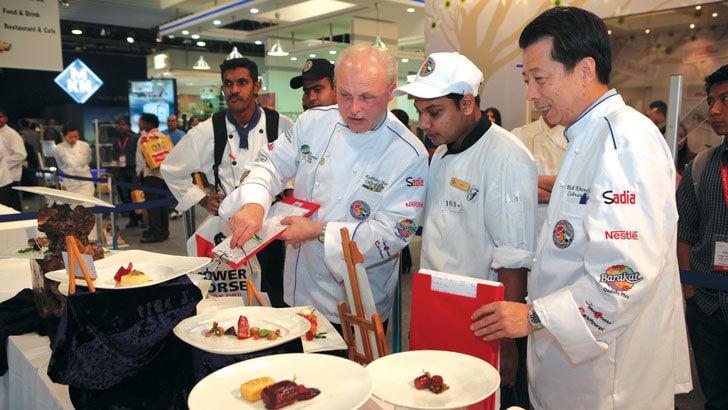
A key trading platform for the sector, Gulfood 2013 is able to boast some impressive statistics. Despite record exhibition space (113, 39 sq m hosting over 4,200 companies from 110 countries, an increase of more than 1,400 new exhibitors from 2012), Gulfood is an event that comfortably balances an agrophobia-inducing sense of sheer scale with a sharply-focused conference programme offering genuine insight into key local, regional and global food trends.
Chief among these was a well-thought through panel session on the first day, chaired by Stefan Breg of Tribe Restaurant Creators, that posed the question ‘Is bigger business, better business?’. The session looked at whether the domination by larger brands was good for the customer in the Gulf region and elsewhere. It was an illuminating and informed debate, wrangled effectively by Breg, who noted that in Dubai alone international brands have a huge domination in the food sector, making up two thirds of the casual dining market.
The line-of experts debating the issue was impressive: Anthony P. Liddiard, CEO RMAL Hospitality PJSC (franchisee of Trader Vic’s and Wagamama’s); Kieran Mallon, COO of Foodmark (part of Landmark Group); Jean-Pierre Fettman, General Manager of Vietnam’s Trung Nguyen Group; and Jason Myers, General Manager of Jumeirah Restaurants.
For Mallon, the issue of small and medium-sized operators being squeezed out of the market is a little overplayed. “The customer is king,” he said “and the customer makes the choice.” For Mallon it’s important for the original founder of a brand to stay hands-on and involved in the operation for future success and longevity.
“The role of the founder is to be customer-centric. It’s very important. If that passion is not there, the brand can really suffer. It’s about having a point of difference that customers admire.”
“People make brands,” added Liddiard, “brands don’t make people. The secret is how you operate that brand in the market. I think absolutely that small brands should create here too. It’s a phenomenal market here in Dubai. If you’re going to open up a new brand, do your market intelligence and get the right people who can operate it. We’re custodians of the brands so we need to get it right.”
Myers was also quick to point out that each market should be viewed on its own terms. “It’s a different market [in Dubai] to Europe and the UK. I’m proud to be part of a group that grew here and innovated here. There’s room to grow and incubate ideas here. While there is the opportunity to expand here it’s the customer that’s driving that growth and we have a responsibility to steer that development. It’s an exciting time.”
Fettmann, whose company is the number one coffee company in Vietnam but new to the UAE, was similarly buoyed by recent forays in the region. “We have been very impressed by positive results here. We need local people who understand their market, but we also need to stick with what we do best and continue to serve our customers” he said.
As well as a comprehensive conference agenda, covering a diverse range of topics from how to recruit and manage the right talent in your franchise operation through to the role of the private sector in assuring food security, Gulfood has also benefited from interesting breakout sessions at exhibitor booths. One such of these on Wednesday 27 February was a discussion between Manitowoc’s Mick Jary and FCSI’s EAME chairman Jonathan Doughty on the subject of ‘Understanding consumer needs in retail’.
“Consumers are looking for absolute certainty in their foodservice equipment” said Doughty. “They want staff, food and equipment to deliver that certainty. Certainty removes human error. Twenty years ago it would take operators anything from between one to three years to respond to a changing food trend – they needed a long time to understand any ethnic, cultural, food or social differences. But now, with the help of their manufacturing partners, they can respond within weeks. We’re having to respond faster because the world won’t wait for change to happen.”
For Doughty, manufacturers have a key role to play to help operators move quickly to encourage innovation too. “Five years ago you could get a new concept to market within one year, if you got lucky. Now it’s three to four months. It’s essentially down to how you process, prepare and finish food. In my world of high volume food (shopping centres, malls and retail outlets), it’s logical that you install accessible technological equipment that doesn’t obstruct the operation.
“As food consultants it’s our job to add to the operator’s knowledge bank and to ‘wrap around them’ and provide them with what they need. The manufacturers job is to wrap around us,” he said.
“Failure is not an option,” Doughty continued. “If you can’t deliver a smaller, neater kitchen in half the space, you won’t succeed these days.” For him, choosing equipment wisely is an essential part of the decision-making process. “Cheap tends to be expensive in the life of a foodservice operation. It’s about providing a solution, a service. That’s how our industry will become more successful,” he said. “The recession has actually been a positive thing in that it’s taught people to focus on managing their businesses much better.”
Gulfood is an important event for communicating that message – focus on managing what you do better in foodservice and reap the rewards. Failure to adapt to a changing trend or a consumer requirement will lead to customers voting with their feet. In a rapidly changing world, no business, big or small can afford to overlook that.
Michael Jones
